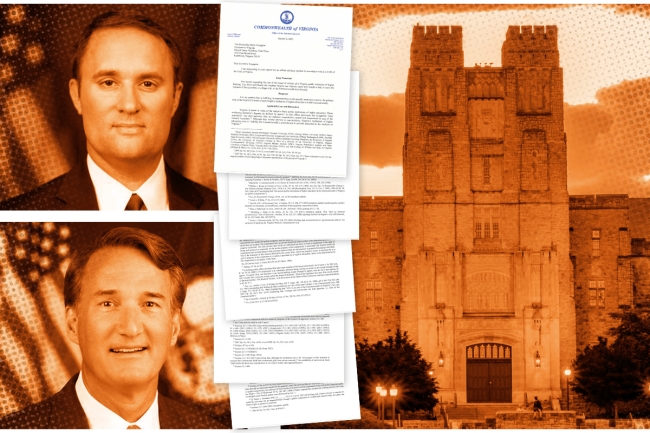You have /5 articles left.
Sign up for a free account or log in.

Photo illustration by Justin Morrison/Inside Higher Ed | Commonwealth of Virginia | Getty Images
A recent opinion submitted by Virginia attorney general Jason Miyares to Governor Glenn Youngkin is raising questions about the future of governing boards at the state’s public institutions.
The opinion, issued last month, responds to inquiries from Youngkin, a Republican, about whether the boards of the state’s public universities are required by law to serve the institutions they represent or state lawmakers and the governor.
Miyares determined that the governing bodies of the universities, known in Virginia as Boards of Visitors, have a “primary duty” to the commonwealth.
“These institutions ‘are state agencies; they are statutory corporations created and empowered by acts of the General Assembly,’” Miyares wrote. “Although they extend services to non-residents, Virginia’s institutions of higher education exist to ‘fulfill the Commonwealth’s commitment to provide education to the students of Virginia.’”
The five-page opinion is unequivocal about to whom the boards should answer.
“It is evident that a board of visitors simply serves as the vehicle by which the General Assembly has chosen to exercise the Commonwealth’s control over its colleges and universities,” it says.
Youngkin’s office did not answer specific questions about the reasons for the inquiry or how the opinion will be applied. Instead, Macaulay Porter, the governor’s press secretary, sent a one-paragraph statement, via email, stating, “The governor’s inquiry reaffirms the primary duty of each board of visitors is to the Commonwealth, which ultimately controls our public colleges and universities. Board members play a critical role in ensuring that Virginians’ taxpayer money is efficiently utilized and that our students receive the best value and quality from our higher education institutions in the Commonwealth. The attorney general’s opinion is an important reminder of whom our institutions ultimately serve and was distributed to each board member and president for reference.”
A Board of Visitors orientation was held from Nov. 14 to 15, as required annually by state law. All new board members must attend the orientation at least once in their first two years of service. An attendee of the meetings told Inside Higher Ed that the role of the boards, as described in Miyares opinion, was discussed.
Miyares was scheduled to speak about “board requirements in the current legal environment” but was unable to attend. Solicitor General Andrew Ferguson spoke in his place.
Youngkin also made remarks on the first day of the orientation. A transcript of his speech, obtained through a Freedom of Information Act request, confirmed his emphasis on the role of the board.
“There is this myth, and I want to dispel it. This myth that board members are cheerleaders for the university and cheerleaders for the president,” Youngkin said. “That is not the way it works. You have a responsibility to the commonwealth of Virginia … I as governor appoints you [sic] to play that role as a responsible extension of the executive branch.”
Higher ed lawyers, leaders of associations representing college boards and college administrators have mixed opinions about whether Miyares and Youngkin’s interpretation of the law is valid or an overreach.
Kyle Beltramini, a policy research fellow at the American Council of Trustees and Alumni, said the opinion is simply a reminder that boards have a duty to the state in which their university is located and its constituents, as well as the institutions the board members represent.
Others see the opinion as an intimidation tactic to get board members to fall in line with Youngkin’s vision for higher education.
Claire Gastanaga, a former Virginia deputy attorney general who oversaw legal services to the state's public colleges and universities, believes the opinion is a threat to the autonomy of public institutions and fears it signals an attempt by the governor to justify the removal of board members whose actions don’t align with his priorities.
Several observers said the attorney general’s opinion alone is not worrisome, but when framed in the larger context of Youngkin’s other efforts to have more control over public institutions, there is cause for concern.
Some point to the highly politicized debates about higher education occurring in statehouses across the country as examples. Others cite legislation being proposed and passed by mostly conservative state lawmakers targeting policies and programs at public colleges and universities with which they disagree.
Several also wondered if Youngkin was taking a page from the political playbook of Florida governor Ron DeSantis, a fellow Republican.
“Standing on its own, this opinion doesn’t do anything. It’s simply an opinion by the attorney general,” said Tom Hyatt, general counsel of the Association of Governing Boards of Universities and Colleges. “But it certainly leaves the mind of the reader wondering what’s next?”
Mixed Opinions
Gastanaga, a longtime lawyer in Virginia with a specialty in nonprofit governance, sees the attorney general’s stance as “an overreach” and suspects it is an attempt to stack the boards in his favor.
Unlike many state agencies, Virginia’s universities operate as public corporations, greatly limiting the ability of the Legislature and executive branch to dictate policy to board members and administrators.
Under state law, higher ed governing board members can only be removed from their positions for acts of “malfeasance, misfeasance, incompetence, or gross neglect of duty.” But the law is broader for other state boards and commissions; it allows for removal for “conflict of interests” or “refusal to carry out a lawful directive of the Governor,” for example.
Gastanaga worries that Youngkin is attempting to justify removal of board members who don’t support his agenda and replace them with appointees who do. She said if the boards’ duty is to the commonwealth, then their duty is to Youngkin as “the personification of the commonwealth,” and he can decide when someone has grossly neglected their role.
“What he’s trying to do is erase the distinctions between the universities as state entities that are structured as public corporations and regular old state agencies,” Gastanaga said. “He knows that the statute doesn’t give them the same authority. So he’s trying to create it out of that language.”
Youngkin’s ability to act unilaterally and appoint new representatives that align with his agenda was likely hampered by the outcome of state elections earlier this month, which put both chambers of the General Assembly under Democratic control.
Ann Franke, a higher education consultant and former counsel for the American Association of University Professors, described the opinion as “lightweight” but somewhat suspicious given Youngkin’s education agenda so far.
“He could replace K-12 ‘parental control’ with ‘public control’ over the universities,” Franke said. “Why shouldn’t the governor or the Legislature, on behalf of the public, prohibit [diversity, equity and inclusion] and critical race theory or ban library books in the public universities?”
The Association of Governing Boards said in a statement via email, “We respectfully disagree with the Virginia attorney general’s position that board members’ primary duty is to the state government, and that a board is simply a tool for the legislature to enact its will.”
Hyatt, AGB’s general counsel, said he “can’t read the mind of the governor” and was hesitant to assume the governor’s intentions. But he did note that the opinion was “curious” and provides “a misguided reasoning … to the fiduciary duties of directors of public institutions.”
“The American higher education system is founded on the independent judgment of volunteer trustees,” he said. “Citizen trusteeship is premised on the belief that a group of individuals, with a wide range of expertise and backgrounds, and adhering to fiduciary duties, will govern a higher education institution more successfully than will direct government control.”
Miyares’s opinion creates a “false dichotomy” implying that focus cannot remain on the institution without also upholding service to the public, Hyatt added. He also noted that the opinion could violate accreditation standards that require boards have “protection from undue influence.”
Beltramini, of ACTA, said the group’s leaders were not troubled by the opinion and hopes it will “drive home to trustees that you do not simply serve the needs of your institution … but you represent the needs and the interests of the public at large.
“That doesn’t necessarily mean that what the trustees ought to do is listen entirely to the Legislature and only seek to do what the Legislature wants,” he added. “It just means that the trustees are in a unique stance as public fiduciaries; they must be listening to all but beholden to none.”
Not the First
Youngkin is not the first governor to try to exert more control over university boards.
Matt Bevin, Republican governor of Kentucky from 2015 to 2019, unsuccessfully attempted to replace the University of Louisville’s Board of Trustees in 2016 after his attorney general issued a similar opinion. A circuit court judge rejected Bevin’s actions, calling the attempt inconsistent with state law and an invitation to future abuses of power.
Miyares’s memo also mirrors an opinion by former Virginia attorney general Ken Cuccinelli, also a Republican, in 2010, which argued that higher ed institutions didn’t have the authority to include sexual orientation and/or gender identity in their nondiscrimination policies. That argument also gained little traction.
Changes to Legislation
A section of Miyares’s opinion refers to a state law that outlines the role of “Governing Boards of Public Institutions of Higher Education.” He specifically highlights text that states that onboarding programs for new board members should include “presentations relating to: board members’ primary duty to the citizens of the Commonwealth.” But the word “primary” was only added to the legislation in 2019 and was nearly unanimously supported by a politically divided Legislature.
Senator Bill DeSteph, the Republican who introduced the bill, said he agrees with Miyares’s opinion, finds it “well thought out” and does not see it as an overreach. He views the opinion as promoting a duty to both the state and the institution, with the public being of primary interest.
“This really solidifies the concern and the problem that I was addressing at the time,” he said.
Context Beyond the Memo
Gastanaga and others noted that the opinion is more worrisome in the broader context of Youngkin’s other actions related to state higher education.
They point to his nominees to the Commission on Higher Education Board Appointments, which advises the governor on college board appointments. Youngkin appointed Edwin Feulner, former president of the Heritage Foundation, a conservative think tank, as chair of the commission in April 2022.
“If you put a guy who’s the former head of the Heritage Foundation at the head of the parade, you can be pretty sure what’s going to be in the parade,” Gastanaga said.
Youngkin also made the controversial appointment of Bert Ellis, CEO of a private equity firm and president of a conservative University of Virginia alumni organization, to the university’s Board of Visitors in February. Ellis was already the subject of a contentious incident on campus at the time.
“You’ve got a bunch of stuff swirling around, so when I look at this opinion, I think, ‘This is the marinade. I wonder what the main dish is?’” Gastanaga said. “They’ve got some stuff they’re putting in this marinade, and then when it gets ready, they’ll bring out the main dish, and we might not like the taste.”




